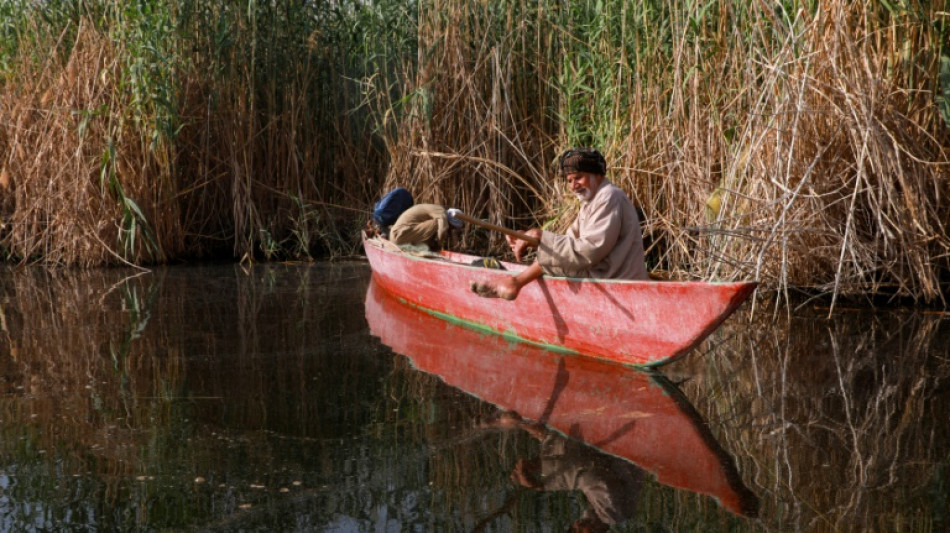
-
 LPGA, European tour partner with Saudis for new Vegas event
LPGA, European tour partner with Saudis for new Vegas event
-
Eyes turn to space to feed power-hungry data centers

-
 Jazz lose Kessler for season with shoulder injury
Jazz lose Kessler for season with shoulder injury
-
League scoring leader Messi among MLS Best XI squad

-
 MLS bans Suarez for Miami's winner-take-all playoff match
MLS bans Suarez for Miami's winner-take-all playoff match
-
McIlroy appreciates PGA of America apology for Ryder Cup abuse

-
 Garnacho equaliser saves Chelsea in Qarabag draw
Garnacho equaliser saves Chelsea in Qarabag draw
-
Promotions lift McDonald's sales in tricky consumer market

-
 Five things to know about New York's new mayor
Five things to know about New York's new mayor
-
Anisimova beats Swiatek to reach WTA Finals last four

-
 US Supreme Court appears skeptical of Trump tariff legality
US Supreme Court appears skeptical of Trump tariff legality
-
AC Milan post third straight annual profit on day of San Siro purchase

-
 Angelina Jolie visits Ukrainian frontline city, media reports say
Angelina Jolie visits Ukrainian frontline city, media reports say
-
UN says forests should form key plank of COP30
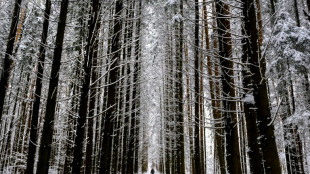
-
 Star designer Rousteing quits fashion group Balmain
Star designer Rousteing quits fashion group Balmain
-
Mexico's Sheinbaum steps up cartel fight after murder of anti-narco mayor

-
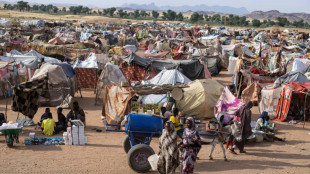 Attack on funeral in Sudan's Kordofan region kills 40: UN
Attack on funeral in Sudan's Kordofan region kills 40: UN
-
Key PSG trio set for spell on sidelines

-
 Democrats punch back in US elections - and see hope for 2026
Democrats punch back in US elections - and see hope for 2026
-
BMW reports rising profitability, shares jump

-
 Bolivia Supreme Court orders release of jailed ex-president Jeanine Anez
Bolivia Supreme Court orders release of jailed ex-president Jeanine Anez
-
Wall Street stocks rise after positive jobs data

-
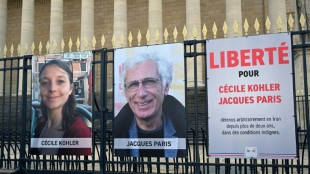 'Hostage diplomacy': longstanding Iran tactic presenting dilemma for West
'Hostage diplomacy': longstanding Iran tactic presenting dilemma for West
-
Rybakina stays perfect at WTA Finals with win over alternate Alexandrova

-
 Le Garrec welcomes Dupont help in training for Springboks showdown
Le Garrec welcomes Dupont help in training for Springboks showdown
-
Brussels wants high-speed rail linking EU capitals by 2040

-
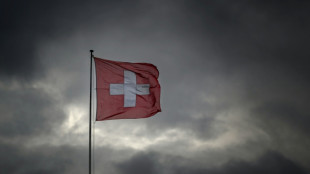 Swiss business chiefs met Trump on tariffs: Bern
Swiss business chiefs met Trump on tariffs: Bern
-
Spain's exiled king recounts history, scandals in wistful memoir

-
 Wall Street stocks steady after positive jobs data
Wall Street stocks steady after positive jobs data
-
Trump blasts Democrats as government shutdown becomes longest ever
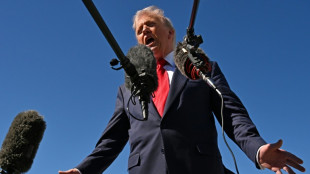
-
 Indian pilgrims find 'warm welcome' in Pakistan despite tensions
Indian pilgrims find 'warm welcome' in Pakistan despite tensions
-
Inter and AC Milan complete purchase of San Siro

-
 Swedish authorities inspect worksite conditions at steel startup Stegra
Swedish authorities inspect worksite conditions at steel startup Stegra
-
Keys withdraws from WTA Finals with illness

-
 Prince Harry says proud to be British despite new life in US
Prince Harry says proud to be British despite new life in US
-
EU strikes last-ditch deal on climate targets as COP30 looms

-
 Stocks retreat as tech bubble fears grow
Stocks retreat as tech bubble fears grow
-
Shein opens first permanent store amid heavy police presence

-
 West Indies edge New Zealand despite Santner brilliance
West Indies edge New Zealand despite Santner brilliance
-
French pair released by Iran await return home

-
 German factory orders up but outlook still muted
German factory orders up but outlook still muted
-
Death toll tops 100 as Philippines digs out after typhoon

-
 Attack on key city in Sudan's Kordofan region kills 40: UN
Attack on key city in Sudan's Kordofan region kills 40: UN
-
'No one could stop it': Sudanese describe mass rapes while fleeing El-Fasher

-
 Champagne and cheers across New York as Mamdani soars to victory
Champagne and cheers across New York as Mamdani soars to victory
-
Medieval tower collapse adds to Italy's workplace toll

-
 BMW boosts profitability despite China, tariff woes
BMW boosts profitability despite China, tariff woes
-
South Africa's Wiese wary of 'hurt' France before re-match

-
 Beyond limits: Croatian freediver's breathtaking record
Beyond limits: Croatian freediver's breathtaking record
-
Tottenham supporting Udogie after alleged gun threat in London


'Leave our marshes alone': Iraqis fear oil drilling would destroy fabled wetlands
Plans to drill for oil in the protected Mesopotamian Marshes of southern Iraq have galvanised villagers and activists determined to save the mythical wetlands already battered by years of drought.
"We will never accept it," marshes activist Murtada al-Janubi told a meeting, seeking to reassure anxious residents gathered in a traditional hall made of woven reeds from the wetlands, to discuss the government's plans for the UNESCO-listed area that is their home.
Everyone nodded in approval.
If they fail to save the Huwaizah Marshes, "a historical era... with its heritage and southern identity will vanish for ever", Janubi, 33, told AFP during a tour of the wetlands that straddle the Iraq-Iran border.
The millennia-old history of the marshes -- the reputed home of the biblical Garden of Eden -- "would end with this oilfield", said the moustached, tanned activist.
In 2023, as China became a major player across various sectors in Iraq, the oil-rich country awarded a Chinese firm the rights to explore the Huwaizah field.
Several residents of Abu Khsaf, the village in Missan province where the meeting with activist Janubi was held, said that at the time they did not fully grasp the implications.
Only this year, when heavy machinery was brought in to conduct seismic studies and open a new road, did the residents say they recognised a "threat" to the swamplands that have sustained their traditional way of life.
The government says that the oil and environment ministries are collaborating closely to avoid endangering the wetlands, and that any activity would occur near, not inside, the marshes.
Satellite images of the area from March, which AFP obtained from Planet Labs, show tracks left by heavy vehicles.
Wim Zwijnenburg of Dutch peace organisation PAX said the images point to the "rapid" construction of "a 1.3-kilometre-long dirt road in the vegetation of the marshes".
- 'All we want is water' -
Missan province already has several oilfields, including one just kilometres (miles) from the marshes.
Its emissions fill the sky with heavy grey smoke, and its gas flares can be seen from the fishing boats that roam the depleted marshes, suffering after years of harsh drought and dwindling water supplies.
Nestled between the Tigris and Euphrates rivers, the Mesopotamian Marshes depend on rivers and tributaries originating in neighbouring Turkey and Iran.
Sparse rainfall and reduced water flows blamed on climate change, upstream dams and government rationing have created shortages with severe impacts on the marsh ecosystem.
Residents expect the marshes to dry up in summer, hoping for a long-absent good rainy season to revive them.
The current water level in many areas is less than a metre (three feet) deep. Um al-Naaj lake, once teeming with fish, is now just three metres deep, compared with at least six before the drought.
Rowing his boat on the lake, fisherman Kazem Ali, 80, said that while the new project may create some jobs, "we, the average people, will not benefit".
"All we want is water," he said.
Rasul al-Ghurabi, a 28-year-old buffalo farmer, said he would never quit "the marshes and the freedom that comes with them" even if the oil company offered him a job.
- Protected core -
One cool March morning, as he led his buffaloes to the marshes to graze, Ghurabi was surprised to see workers laying cables and drilling holes.
A cable caused one of his animals to stumble, he said.
The marshes contain a core area that serves as a habitat for numerous species, including migratory waterbirds, surrounded by a buffer zone for protection.
Activists have accused authorities of conducting seismic studies within the core, which the state-owned Missan Oil Company denies, saying that the vehicles spotted in the area were carrying out work for a separate field nearby and had since left.
The Huwaizah oilfield was discovered in the 1970s, and Iraq shares it with Iran, which has been extracting oil for a long time.
The Missan Oil Company says that 300 square kilometres (116 square miles) of the field's area overlap with the marshes' buffer zone, but that the oilfield does not encroach on the core.
An environmental impact assessment concluded in 2024 would provide "the baseline for work in the field", the company said, adding that exploration would take place "without harming the natural habitat".
According to environment ministry official Jassem Falahi, the protected status of the marshes does not bar development projects.
"But investment is subject to specific conditions and standards that must not disturb the core area... or affect the site and its biodiversity," he told AFP.
- Balance -
Iraqi activist Ahmed Saleh Neema, a vocal advocate for the protection of the marshes, expressed concerns that oil companies might not adhere to regulations and further drain the marshes.
A UNESCO spokesperson told AFP that "concerns have been raised in recent years" over the potential impact of oil-related activities on the marshes.
Across the border in Iran, local media have long warned against the environmental impact of oil projects.
In a report earlier this year, two decades into oil activities in the wetlands known in Iran as Hoor al-Azim, the Tasnim news agency said energy companies had obstructed water flows and drained areas to build infrastructure.
Tasnim also said that oilfields have polluted water resources.
Environmental activist Neema said authorities should strike "a balance between two great resources: the oil and the marshes".
Iraq is one of the world's largest oil producers, and crude sales account for 90 percent of state revenues.
But while oil is financially vital, the marshes represent the livelihood of its people and "the heritage, the folklore, and the reputation of Iraq", Neema said.
Back in the village of Abu Khsaf, Janubi said: "Our region is already teeming with oilfields. Isn't that enough?"
"Leave our marshes alone."
G.Schmid--VB



